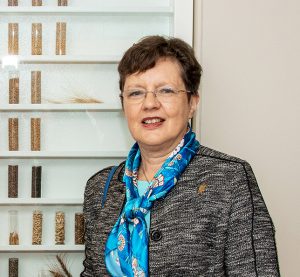Message from the Chair of the Board of Trustees

The year 2020 has been unprecedented, in terms of both the challenges from the COVID-19 pandemic and the initiation of a far-reaching transformation of CGIAR into a more aligned and stronger organization.
This was the fourth year in the execution of the International Maize and Wheat Improvement Center (CIMMYT) Strategic Plan 2017-22. Notwithstanding some pandemic-induced reduction in research activities, we witnessed the continued delivery of its research and partnerships outcomes for the benefit of millions of the poorest smallholder farmers. The wide-ranging adoption of CIMMYT varieties in farmers’ fields and continued progress in fighting pests and diseases by exploiting the rich diversity of CIMMYT’s genebanks are particular highlights. More generally, CIMMYT continues to pivot further towards a systems-based approach to addressing the pressing challenges of enhancing the livelihoods of smallholder farmers in a climate change crisis.
The pandemic required a significant risk management response which was successfully implemented and continues to date, limiting as much as possible adverse impacts on both Center operations and the health and wellbeing of its staff. The Board acknowledges and applauds the tremendous efforts of staff at all levels in these difficult times.
CIMMYT was able to maintain its funding pipeline and achieved a break-even financial result for the year. CIMMYT has concluded the 2020 financial year with a $0.6 million deficit. The financial result, before taking into account actuarial losses as a consequence of declining discount rates globally, was kept at a $0.1 million surplus. Reduced indirect cost recovery was compensated by lower overhead costs, a result of cost-saving measures initiated by management. For 2021, CIMMYT is well-positioned — with the available budget, estimated carryover of 2020 funding, and pipeline aligned with the organization’s high-level resource mobilization goal — to maintain at least the same level of funding as in recent years.
In 2020, the One CGIAR transition gathered real momentum. With an ambitious aim to further synergize assets, partnerships, and operations to deliver greater impact, the reformulation of CGIAR will ensure that we can fully and effectively respond to new and emerging global challenges.
As part of this transformation, in January, a Transition Consultation Forum was formed to allow for multi-stakeholder input and advice on the transition, along with thematic Transition Advisory Groups and a Transition Program Management Unit.
CIMMYT was a key participant in the gradual execution of the One CGIAR Recommendations adopted by the CGIAR System Council in November 2019. With full support from the Board, Center leadership was actively involved in this initiative across a range of Communities of Practice and played an important role in the development of key documents. A major milestone in 2020 was the approval in December of the new CGIAR 2030 Research and Innovation Strategy and the CGIAR Performance and Results Management Framework, which constitute a bold and relevant blueprint for impactful research and transformative change.
Also, in 2020, welcome steps toward unified governance were made. The CGIAR System Board was reconstituted in September, at which time the three members of the Executive Management Team (EMT) began their tenure. The EMT will further steer the One CGIAR transition, under the oversight of the CGIAR System Board.
In October 2020, the Board endorsed significant amendments to CIMMYT’s Constitution to enable the Center to participate in the governance aspects of the One CGIAR reform. These changes enabled a reconfiguration of the Center’s Board, with CGIAR System Board members joining the CIMMYT Board and several existing Board members departing. The strong contributions of the latter are much appreciated.
Due to the pandemic, the Board was unable to meet in person. Nevertheless, it was able to follow closely the Center’s progress in meeting the year’s objectives. The Board acknowledges the tremendous efforts and achievements of CIMMYT staff and partners, and looks forward to another successful year.
